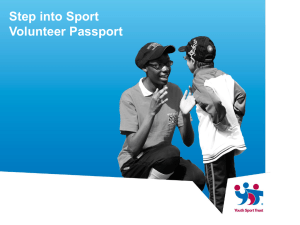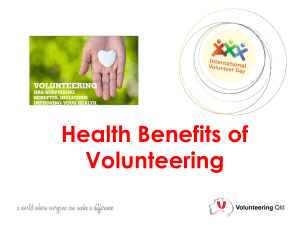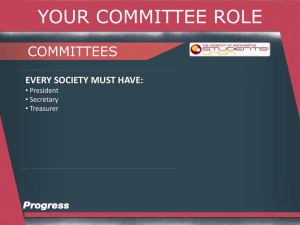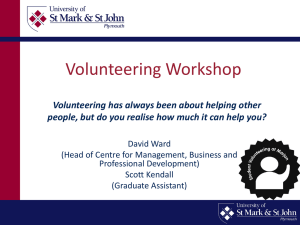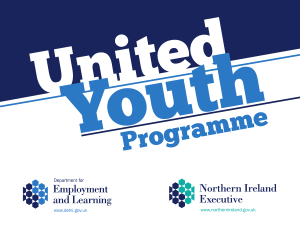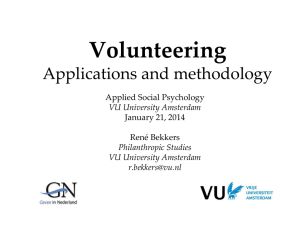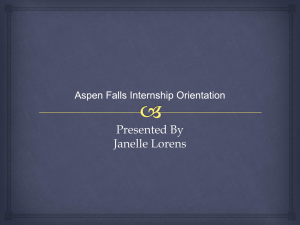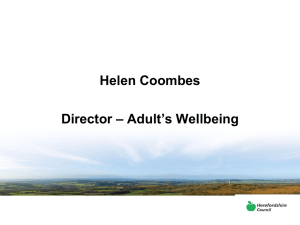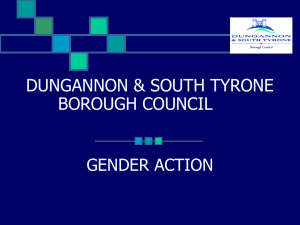Peter John (MS PowerPoint , 681kb)
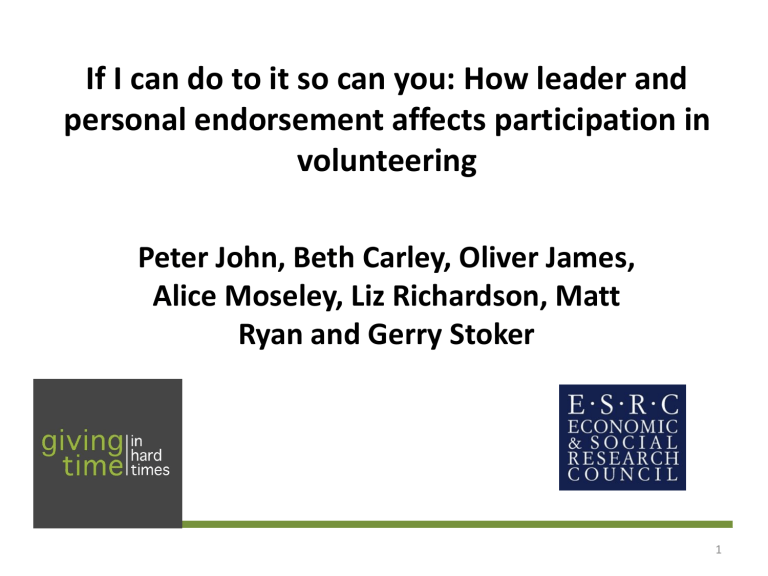
If I can do to it so can you: How leader and personal endorsement affects participation in volunteering
Peter John, Beth Carley, Oliver James,
Alice Moseley, Liz Richardson, Matt
Ryan and Gerry Stoker
1
Recruitment: leader endorsement
• Invitation to volunteer from a ‘leader’ who is already doing the activity – a politician, celebrity, another citizen
• May motivate on basis of:
– modelling (providing positive example) (Bekkers & Wiepking, 2011;
Glӧckner et al., 2010)
– legitimisation/ confirmation of quality of org/ activity (Bekkers &
Wiepking, 2011; Vesterlund, 2003; Andreoni, 2006)
– leader self-sacrifice (De Cremer et al., 2009 ; Glӧckner et al., 2010).
• Politicians have authority but effect of ‘anti-politics’? (Hay,
2007); many volunteers a-political/ motivated by lack of institutional trust (Eliasoph, 2009; John et al., 2011)
2
Research Design
• An experiment that assesses the impact of endorsements from people in different types of social positions on the decision to volunteer.
• The idea is that potential volunteers will be influenced by endorsement in the form a request in which the endorser is cited as having undertaken volunteering activity themselves (‘do as I do’) rather than merely because the endorser recommends volunteering as a desirable activity
(‘do as I say’).
3
More on design
• Five participating universities with a total of
100,974 students: UCL, Southampton, Salford,
Exeter, Plymouth
• Block randomisation within each university (done by York Trials unit- thanks esp to Hannah)
• The instrument was a standard e-mail invitation to volunteers that went to all students, but with additional endorsement information included in the treatment messages from three different types of endorser.
4
5
Treatments
• Those in the control group receive a simple invitation from the volunteering unit at their respective university encouraging them to volunteer and sending them a link to the volunteering unit’s website.
• Those in the treatment groups receive a similar invitation, but delivered in the framework of an endorsement.
• Treatment 1 informs the recipient about a politician who has volunteered
• Treatment 2 concerns a celebrity volunteer;
• and Treatment 3 conveys endorsing information about the activity of another student volunteer;.
6
Detail on endorsements
• The individual politician and celebrity endorsers included in these messages are people who have been identified through internet research as having undertaken volunteering and were invited by the research team.
• Student endorsers were contacted and their agreement to participate sought through the volunteering units.
• In order to avoid confounding endorsement effects with organisation name or brand recognition effects, each endorsement will convey the type of volunteering activity undertaken by the endorser, e.g. volunteering for an organisation that helps the elderly, rather than referring to a specific named organisation.
7
More on endorsers
• Endorsers not prominent or controversial personalities.
• Politicians were members of Parliament, but not members of the government and selected from across the main political parties, although party affiliations were not be mentioned
• The student endorsers selected from outside of the institutions in the study to reduce personal acquaintance effects.
8
Dear *|FIRSTNAME|*,
We are writing to you directly from Community Action, part of the University of Exeter Students’ Guild, to invite you to sign up to our service.
Anyone can volunteer and all sorts of people do, including national politicians like Gloria de Piero, Dominic
Rennie Raab, Andrew Percy and Roberta Blackman-Woods - MPs who support, develop and promote charitable projects, organisations, and causes.
Everyone needs a break from the routines of student life, so why not try something enjoyable that can make a difference to other people too?
Visit the Community Action website to find out more: http://www.exeterguild.org/doingthings/communityvolunteering
And registering with our group just takes a couple of clicks: http://www.exeterguild.org/societies/community-action/
Volunteering is a great way to give something to others while gaining new skills and confidence, making friends and exploring career options. From one-off activities, to more extended roles, there is something for everyone.
We look forward to hearing from you!
Community Action, University of Exeter
In partnership with the Giving Time research project http://giving-time.org/.
9
Our priors
• We did a research design document presented in May 2013 with analysis plans and study design
• Stated expected hierarchy of treatment effects from literature (hard to compare with our intervention)
• Celebrities > peers > control > politicians
• Heterogeneity by university (but no expected relationships)
10
Monitoring outcomes
• All invitations contained a link to the student volunteering service where students interested in volunteering register.
• There are two binary outcome measures: firstly whether the recipient clicks through the link contained in the e-mail and registers with the volunteering unit, as a measure of intention to volunteer; secondly, whether the student takes up a volunteering role, as a measure of volunteering activity, based on information provided by the volunteering unit at the institution in question
11
12
Data
• A limited set of covariates for analysis were provided from student records, including gender, ethnicity, year of study and subject discipline.
• Multiple outcome measurement ranging through no response, clickthroughs, registered intention to volunteer, taken up volunteering role and training
• Measured by Mailchimp, student records from volunteering units and survey
13
14
Clickthroughs to UCL’s VSU website
15
16
17
18
19
20
21
Summing up the findings
• Endorsements have no positive effects on click-throughs to volunteering units
• Student endorsements are negative, but would other kinds of endorsement work?
• Impact of politicians on uptake of training
• Patchy impact of celebrities
• Some little heterogeneity by university and ethnic background
22
